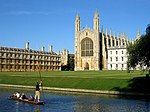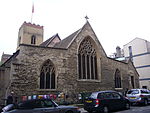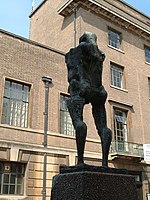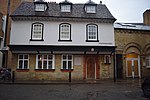Cambridge Guildhall
City and town halls in CambridgeshireCulture in CambridgeGovernment buildings completed in 1939Grade II listed buildings in CambridgeHistory of Cambridge ... and 2 more
Politics of CambridgeUse British English from April 2022

Cambridge Guildhall is a civic building in the centre of the historic city of Cambridge, England. It includes two halls, The Large Hall and The Small Hall, and is used for many disparate events such as comedy acts, conferences, craft fairs, live music, talks, and weddings. It is also used by the University of Cambridge for certain examinations. It is owned and managed by the Cambridge City Council, and it is their seat of government. The Guildhall is located on the south side of Market Hill, the market square in Cambridge, between Peas Hill to the west and Guildhall Street to the east. It is a Grade II listed building.
Excerpt from the Wikipedia article Cambridge Guildhall (License: CC BY-SA 3.0, Authors, Images).Cambridge Guildhall
Market Hill, Cambridge Newnham
Geographical coordinates (GPS) Address Nearby Places Show on map
Geographical coordinates (GPS)
| Latitude | Longitude |
|---|---|
| N 52.2049 ° | E 0.1192 ° |
Address
Market Hill
CB2 3NR Cambridge, Newnham
England, United Kingdom
Open on Google Maps









